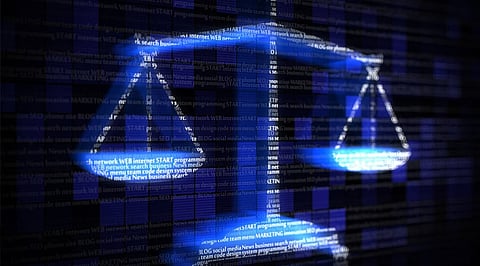


Technology has penetrated all industries. We are witnessing the impacts of HealthTech, FinTech, AgriTech, EdTech, LegalTech. Wait. Did it say LegalTech? Did the sentence make a mistake? Absolutely not because technology has already been incorporated into legal systems to aid different procedures. China has been grabbing eyeballs since it put forth a recommendation to introduce its first AI and other disruptive tech-integrated legal system recently. The initiative was a step towards establishing smart courts.
Smart courts ensure that the judicial processes are aided by disruptive technologies and softwares to cater to a digital environment. The ongoing digitization and automation have great impacts across all industries and systems. Cutting-edge technologies like AI, data analytics, and blockchain is proving to be helpful for the judiciary.
According to the South China Morning Post report, the Chinese courts have decided to upgrade into becoming a fourth-generation smart court by 2025, under its 14th five-year plan and will include a centralized database platform for all judicial data and a control hub overseeing all aspects of the smart court initiative across the nation.
This initiative by China lays the limelight on the significance of disruptive technologies and AI in courts. The use of artificial intelligence in judiciary will automate mundane repetitive tasks and also aid in better and faster legal decision-making. A study by researchers from Duke Law, University of Southern California, and Stanford Law School in 2018 revealed that AI can be more accurate than actual lawyers in reviewing contracts. The study involved LawGeex, an AI contract review platform, which achieved a 94% accuracy rate in reviewing Non-Disclosure Agreements, compared to 85% accuracy of expert lawyers.
Looking for litigation issues, contract clauses, and scanning data to filter out important documents can be automated by AI, thus unburdening legal professionals from these tasks and minimizing errors. A year back, a Wired report talked about how the Estonian Ministry of Justice asked a research team to design a 'robot judge' that could settle small claims cases and disputes, hence clearing backlogs and piling cases. Isn't it interesting how these AI robots will announce the judgments if programmed correctly? Well, this scenario will also raise ethical questions since AI has always carried biases towards people of colour, and genders other than men. Thus, ethical AI algorithms must be addressed.
Data analytics, blockchain, machine learning, and cloud computing play a pivotal role in smart courts and AI-integrated judicial systems. Finding relevant information from huge loads of data can be sorted through big data analytics and cognitive computing. Tracking legal evidence, judgment patterns, monitoring the whole judgment process, and the list goes on. Advanced analytics can now increase the pace of judicial procedures. Predictive analytics can be used in courts to predict legal insights and even predict the chance of winning or losing a case. Recently, the Chief Justice of India, A S Bobde affirmatively introduced an AI-based research portal to carry out legal research in the judicial system. The Livemint report on the same says, "Welcoming the new AI system, the CJI said it was the first of its kind in the world as it would collect all the information, much faster than a human being, which a judge would require to decide a case, but it will not come out with a decision." Further, the report quotes the CJI saying it could become disastrous to the judicial system if AI is allowed to make decisions in a case.
For a country like India, where the judicial processes move at a snail's pace and the system is overflowing with unattended cases, AI in judiciary and other tech-integrated legal systems would be highly beneficial.
Blockchain is another revolutionary technology that is often used by judiciary systems and courts to secure and record evidence. According to Legal Daily, the Shangyu District People's Court in Shaoxing City, Chine gave the first-ever criminal sentence based on blockchain recorded evidence. The judicial system did so to encrypt the evidence and save it from tampering or loss. Another example would be of Dubai International Financial Centre (DIFC) partnering with Smart Dubai Office to launch a task force for the world's first Court of the Blockchain to make the legal system more efficient.
Blockchain as a decentralized public ledger will minimize data breaches and enhance verification methods. Storing court judgments and other details will enhance accessibility and transparency without the risk of being tampered with. Evidence storage and tracking is another significant impact of blockchain in the judiciary.
All these disruptive techs if introduced with an unbiased and ethical algorithm will definitely help the judicial systems and lawyers in simplifying the procedures. If the machine can be free of human biases, then isn't that the best way to enhance the legal system? To reach there we still need to have discussions and discoveries. Otherwise, as the CJI said, it could become a disastrous move.
